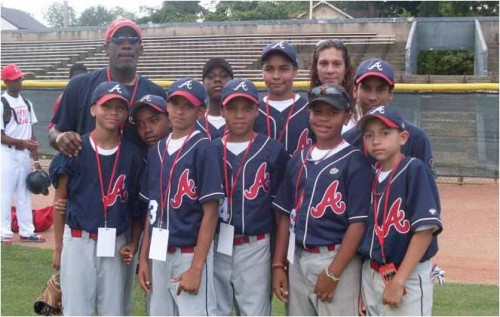CU Electrician Kevin McAllister’s Summer Sports Programs for Uptown Youth

Kelvin McAllister grew up in the streets of Manhattanville, part of a large sports loving family that played ball in the parks and watched the neighborhood lurch through many crises. So in the 1980s, when McAllister saw the impact that the closing of community and daycare centers was having, he decided to do something about it: he started the Uptown Inner City League, a free sports program aimed at providing "outdoor activities that would keep kids safe and off the streets and out of trouble," says McAllister, 52, who has worked as an electrician at Columbia University for the past 27 years.
Today, the League offers a co-ed sports programs for around 400 kids, ages 2 to 18, for nine months a year. While focused on baseball, the League also has basketball, softball and recreational activities based in a playground on 131st Street and Amsterdam, which makes it very much a community-based organization--one that also receives substantial financial, material and personal support from the Columbia University community. For the past eight years, Columbia Community Service, which supports critical community organizations, has provided an annual grant of $5,000, or half of the league's $10,000 annual budget.
That might seem like a small amount, but the money is essential to the League's operation. Funding goes toward the cost of essentials like bats, uniforms and trophies and a much- anticipated trip each summer to Greensboro, North Carolina, to attend the Black World Series baseball event. Yet Columbia provides much more than just money: Columbia engineering students and faculty are currently involved in helping design and build a shed for storing sports equipment and a durable, lightweight easy-to-assemble mobile batting cage for the League.
It's the kind of helping hand that McAllister believes is crucial for the University and the League. "Columbia plays an important role in the community, and we are in the community too," he says. "We work hand in hand for the community."
In that sense, the league is very much a grass roots operation. It serves kids in the neighborhood regardless of race or ethnicity - or even sports skills - who might otherwise end up in gangs or criminal activity. Many participants come from low income, single-family homes. They would have few opportunities to get involved in sports. "This gives kids another direction," McAllister says. Even if they can't afford to pay, he adds, "we want them to be able to enjoy sports."
With the League firmly established, McAllister is now thinking about a new direction: setting up a learning center that would, with the help of Columbia students and staff, provide academic tutoring to kids in addition to the sports program. The idea is to find a small classroom for about 10 students, possibly at SIPA, who would receive help on weekends to prepare for their SATs, to be staffed by faculty, students or even retired teachers in the community. Like the League and its sports program, this academic offshoot would be all about supporting kids and the community with the help of Columbia. "You got to give back to the community, and give kids something to believe in," McAllister says, "something they can depend on."